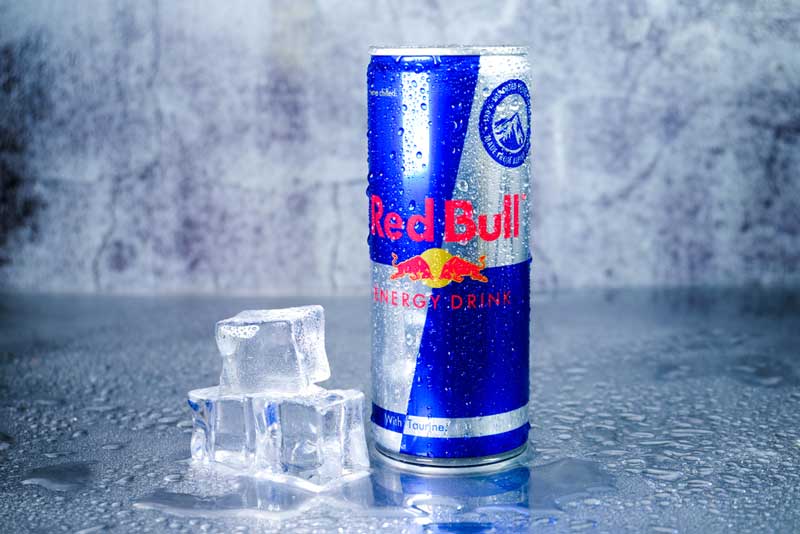Is Red Bull vegan? This is a common question that pops into the mind of anyone on a vegan diet that requires caffeine to energize themselves during a hectic day.
Despite the high quantities of caffeine, sugar, and artificial enhancements in numerous types, an energy beverage can serve as a prompt solution for weariness or fatigue when you must endure extended work periods.
Since its introduction in 1987, Red Bull remains one of the most renowned and widely consumed energy beverages accessible in the present market.
However, individuals who possess an inquisitive nature or have recently embraced the vegan way of life may ponder: Is Red Bull vegan?
Within this article, we delve into the various classifications of Red Bull, scrutinize its compatibility with veganism, and provide the essential details that will empower you to make an educated choice.
Is Red Bull Vegan?
To answer the question, is Red Bull vegan? The ingredients used in making red bull need to be thoroughly examined.
Considering the ingredients of Red Bull Energy Drink and how they are sourced, we can say that Red Bull Energy Drink does not get any of its ingredients from animals.
However, Red Bull is considered non-vegan due to the presence of refined sugar in which animal bones are incorporated in its processing and artificial colors tested on animals.
The basic principle of veganism is to ensure that no harm is done to any animal, and using artificial colors goes against this.
Also Read: Are Fruity Pebbles Vegan? (Everything To Know) and Is Cinnamon Toast Crunch Vegan? (Everything to Know)
What is Red Bull?
When you hear Red Bull, you think of an energy drink, which is what it is. The legendary energy drink Red Bull hit the market in 1987 and has, since then, distributed billions of its products globally. Energy drinks typically contain caffeine and other ingredients like flavorings, carbonated water, and sugar; Red Bull is no exception.
Let’s delve deeper into the ingredients that make up this renowned energy drink.
What Is Red Bull Made Of?
Upon initial inspection, several ingredients in Red Bull might lead one to presume their non-vegan nature. Let’s get the facts!
- Sugar
While sugar is frequently derived from animals, particularly the calcined bones of animals, this does not apply to the sugar utilized in Red Bull. Contrarily, Red Bull’s sugar is derived from beets, eliminating the use of bone char and rendering it a vegan-friendly ingredient.
- Citric Acid
This serves the dual purpose of enabling Red Bull’s extended shelf life and imparting a mildly acidic taste that adds to its overall appeal. It is primarily derived from vegetables and bacteria.
- Sucrose
Sucrose is employed to enhance the sweetness of Red Bull, thus enhancing its flavor appeal, and it is also derived from plant sources.
- Pyridoxine HCI, Calcium Pantothenate, Niacinamide
These compounds are different forms of vitamins utilized in Red Bull, and they are produced using artificial processes and materials, ensuring that the beverage is suitable for vegans.
- Magnesium Carbonate
Magnesium Carbonate is employed in Red Bull to maintain the artificial coloration and enhance its nutritional value and is also extracted from plant sources.
- Taurine
Red Bull is often hesitately regarded as non-vegetarian due to the presence of taurine, with some misconceptions suggesting that it is derived from bull semen. However, this is a myth. The taurine found in Red Bull is synthetically made and serves as a physical stimulant alongside caffeine.
Types of Red Bull Flavours
-
Red Bull Energy Drink
The widely recognized Red Bull energy drink contains a caffeine content comparable to a cup of coffee. A glass of orange juice has nearly the same sugar levels as the Red Bull energy drink. Additionally, a single can of Red Bull energy drinks supplies essential B vitamins and the amino acid taurine derived from plant-based sources.
-
Red Bull Summer Edition
The Summer Edition offers a cold and delightful caffeinated beverage for morning consumption. With its peachy taste, it caters to those who are not fond of the slightly acidic taste of the original version.
-
Red Bull Sugar-Free
The sugar-free variations of Red Bull energy drinks do not compromise the potency of this highly caffeinated beverage. Instead of getting sugars from beets as in the regular versions, Red Bull Sugar-Free incorporates sweeteners such as Aspartame and Acesulfame K, which provide little to no calories while imparting sweetness to the drink.
-
Red Bull Purple Edition
The Purple Edition adds another outstanding fruity option to the Red Bull lineup. Infused with the flavor of acai berry, this caffeinated beverage offers a refreshing experience that provides a similar effect to a cup of hot coffee.
-
Red Bull Yellow Edition
Red Bull Yellow stands out with its distinct tropical flavor, while most of its ingredients remain consistent with other varieties. Except for artificial colors, the Yellow Edition contains no other ingredients that could raise concerns regarding its suitability for vegetarians. Despite the intense fruity taste, the sugar and calorific levels remain the same as the original version, ensuring this drink is also suitable and safe for consumption.
Are Artificial Colors Vegan?
It won’t astonish you that the hue of Red Bull is not inherent, and thus, Red Bull incorporates synthetic colors. Consequently, do artificial colors align with vegan principles?
This is where the boundary can become indistinct for individuals adhering to a vegan lifestyle. The prevailing variety of food pigmentation encountered in food items is artificial coloring, encompassing designations like Blue 1, Red 40, and numerous others.
Nevertheless, artificial colors are controversial within the vegan community for various reasons. These colors are usually synthesized in commercial laboratories with isolated chemicals or processed from a petroleum by-product.
Nevertheless, the moral concern resides in the fact that these colorants are regularly subjected to animal tests, specifically on mice and rats.
It is significant to emphasize that the food producers who utilize these hues as components do not conduct the examination. Instead, animal experimentation is performed by scientists to attempt to demonstrate whether they are dangerous or safe to ingest in various food products.
Most vegans consume artificial colors, yet more stringent vegans oppose them due to their frequent involvement in animal testing. Nevertheless, this decision will hinge on your individual inclinations and ethical values as a vegan.

Refined Sugar
It cannot be disputed that most energy beverages possess elevated sugar levels. It is worth noting that dedicated adherents of veganism do not regard refined sugar as compatible with their dietary choices.
This arises from the fact that refined sugar undergoes a manufacturing process involving the utilization of animal bone char to eliminate impurities and enhance its whiteness. Consequently, even though white sugar may not be inherently derived from animals, it does not meet the criteria for being considered vegan, resulting in a somewhat ambiguous situation dependent on the individual vegan’s choices.
Like many other energy drinks, most formulations of Red Bull include refined sugar and artificial colors. This further adds to the contentious nature of Red Bull within the vegan community as a product that raises concerns.
Moreover, it is important to note that Red Bull offers sugar-free alternatives such as Red Bull Sugar-free and Red Bull Zero. These variants use artificial sweeteners, specifically acesulfame K and aspartame, rather than sugar.
Indeed, these sugar-free options of Red Bull are comparatively more compatible with a vegan lifestyle than the original Red Bull energy drink. Using artificial sweeteners offers a potentially more vegan-friendly opportunity for individuals following a vegan diet.
Unless one follows a completely unprocessed, raw vegan diet, adhering strictly to a fully vegan diet is exceedingly challenging. This is primarily due to refined sugar in various food and beverage products. Its famous usage makes it nearly impossible to avoid refined sugar in one’s diet completely.
If you aim to steer clear of refined sugar as a vegan, it is crucial to be mindful that a significant portion of your sugar consumption will come from processed foods. This is an important aspect to consider while following a vegan lifestyle and striving to minimize your refined sugar intake.
Also Checkout: Do Sour Patch Kids Have Gelatin? (Answered) and Are Starburst Wrappers Edible? (Everything to Know)
Frequently Asked Questions-Is Red Bull Vegan?
Is the Taurine in Red Bull Vegan?
Taurine is predominantly vegan-friendly, contrary to the misconception that it is derived from bulls’ urine. In reality, it is synthetically manufactured and does not involve animal-derived sources. Even in the rare instances where animal sources are used, it is important to clarify that bulls’ urine is not involved in the extraction process.
Are There Animal Products in Red Bull?
The primary dietary sources of taurine include fish, meat, and dairy products. It is important to note that the taurine in Red Bull is not derived from animal sources such as the bull’s testicles.
Why Is Red Bull Not Vegetarian?
A significant portion of Red Bull’s ingredients are synthesized in a laboratory, making them mostly synthetic. While synthetic ingredients may not necessarily deter ethical vegans, labeling Red Bull as ‘plant-based’ would be inaccurate due to the extensive use of laboratory-synthesized ingredients.
What Are the Benefits of Red Bull?
Red Bull possesses several benefits, like B-group vitamins which are soluble in water, such as vitamin B12, vitamin B2, and vitamin B6. This group of vitamins helps the body to carry out proper metabolism, thus producing the needed energy from the decomposition of proteins and carbohydrates. Hence, they reduce the frequency of fatigue and tiredness.
Conclusion- Is Red Bull Vegan?
This article was focused on answering the question Is Red Bull vegan?
In conclusion, whether to consume Red Bull as a vegan depends on individual preferences and ethical considerations.
If you are a vegan comfortable consuming refined sugar and artificial colors, then Red Bull can be considered vegan-friendly.
However, if you have concerns about these ingredients, it may be more suitable to go for alternatives like coffee. Hence, you are responsible for making an appropriate decision after considering the facts mentioned earlier.

